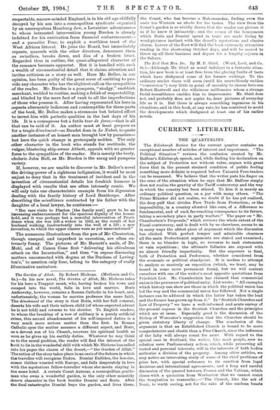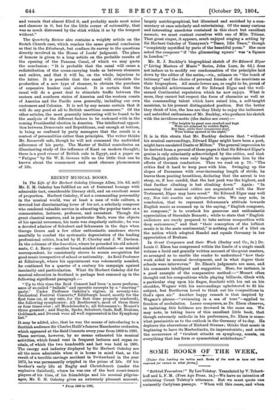Political Situation" reviews the confusion created by Mr.
Balfour's Edinburgh speech, and, while finding his declaration on the subject of Protection not without value, argues with great force that in the present strained condition of public feeling
something more definite is required before Unionist Free-traders can be reassured. We believe that the writer puts his finger on the crux of the situation when he says that Mr. Balfour simply does not realise the gravity of the Tariff controversy and the way in which the country has been stirred. To him it is merely an ordinary political question, on a par with many others. " The Prime Minister did not realise, we doubt if he has yet realised, the deep gulf that divides Free Trade from Protection; or the impossibility, in a country situated like ours, of a difference so fundamental, and of such far-reaching consequence to its future, taking a secondary place in party warfare." The paper on " Mr. Chamberlain's Proposals," which reviews the whole extent of the Fiscal controversy, and is dealt with by us elsewhere, seems to us in many ways the ablest piece of argument which the discussion has elicited. With perfect temper and admirable clearness all the main Protectionist arguments are stated and examined; there is no blunder in logic, no recourse to rash statements or vain repetitions ; the ultimate fallacies are exposed with an almost friendly impartiality. But the exposure is final, both of Protection and Preference, whether considered from the economic or political standpoint. It is useless to attempt to analyse so masterly an exposition (which, we trust, may be issued in some more permanent form), but we will content ourselves with one of the writer's most apposite quotations from Friedrich List. Mr. Chamberlain has claimed that commercial union is the precursor of political unity. List wrote : " All examples which history can show are those in which the political union has led the way and the commercial union has followed. Not a single instance can be adduced in which the latter has taken the lead and the former has grown up from it." In "Scottish Churches and Law of Property" we have a well-informed and acute survey of the present impasse in the Scottish Churches and the principles which are at issue. Especially good is the discussion of the Bishop of Worcester's suggestion that the Churches should be given statutory liberty of change. The conclusion of the argument is that an Established Church is hound to be more comprehensive and elastic than a Free Church, since the influence of the laity will always count for more. With regard to the special case in Scotland, the writer, like most people, sees no solution save Parliamentary action, which, while preserving all vested and personal interests, will in the interests of both bodies authorise a division of the property. Among other articles, we may notice an interesting study of some of the chief problems of prize law, with special reference to its sanction from legal decisions and international agreements ; and a long and careful discussion of the quarrel between France and the Vatican, which closes with a quotation from Warburton that we cannot resist the temptation to transcribe :—" The Church, like the ark of Noah, is worth saving, not for the sake of the unclean beasts
and vermin that almost filled it, and probably made most noise and clamour in it, but for the little corner of rationality, that was as much distressed by the stink within it as by the tempest without."
The Quarterly Review also contains a weighty article on the Scotch Church case, which reaches the same general conclusion as that in the Edinburgh, but confines its survey to the questions directly involved in the House of Lords' judgment. The place of honour is given to a long article on the probable results of the opening of the Panama Canal, of which we may quote the conclusion : " It is probable that the canal will cause a redistribution of the ocean-carrying trade as between steamers and sailers, and that it will be, on the whole, injurious to the latter. It is possible that the canal will stimulate the production of a new type of steamer, to obviate the purchase of expensive bunker coal abroad. It is certain that the canal will do a great deal to stimulate traffic between the eastern and southern states of America and the western coasts of America and the Pacific area generally, including our own customers and Colonies. It is not by any means certain that it will do any good at all to British maritime commerce." Of the other articles, the most generally interesting will be found to be the analysis of the different factors to be reckoned with in the coming Presidential election in America. The intellectual opposi- tion between Democrats and Republicans, real enough at bottom, is being so confused by party managers that the result is a contest of personalities rather than principles. The writer thinks Mr. Roosevelt safe, though he will not command the undivided adherence of his party. The Master of Balliol contributes an illuminating study of the influence of Kant on modern thought; there is a good résumé of British rule in Egypt, and a paper on "
Fatigue" by Sir W. R. Gowers tells us the little that can be known about the commonest and most obscure phenomenon of life.



















































 Previous page
Previous page